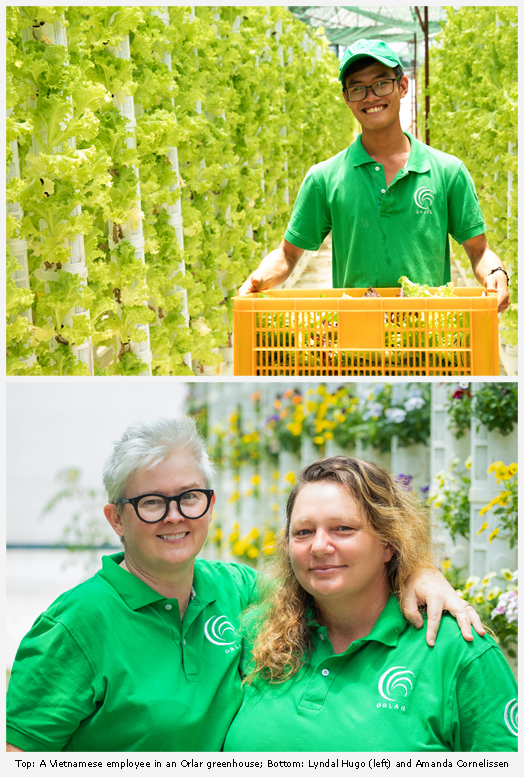Millions of people – almost equal to Australia’s entire population – live in the Mekong Delta region of Vietnam. Their food-growing land is already feeling the impact of rising sea level and salination. Available freshwater is polluted, and in short supply.
Lyndal Hugo, born into a Newcastle mining family, knows a bit about the plight of those millions because she now lives among them in Ho Chi Minh City (formerly Saigon), built on flats at the delta’s edge. She’s a scientist, but commonsense alone tells her that this part of the world is a prime candidate for a climate catastrophe affecting huge numbers of people.
Right now Hugo and all her fellow workers in their Vietnam-based agribusiness Orlar are having to deal with another attack from nature – a resurgence of Covid in their region with the prospect of worse to come if the Omicron variant gets established in South East Asia.
The years of Covid and increasingly frequent extreme weather events tell us there’s no such thing as economic certainty and we should stop thinking we can ever return to normality, whatever that may be. But one thing is certain – we will always need food, all of us, every day. If whole populations are denied that, bad things happen.

Hugo is driven by a deep concern about the impact of pollution and climate change on poor countries – both key Mekong Delta issues. Last month she told an interviewer from one of her venture’s backers, SNV Netherlands Development Organisation, that Orlar set up in Vietnam because of the country’s vast need for clean food.
Last week I drew on the wisdom of farmer and thinker Wendell Berry to question the notion that technology-driven “industrial farming” was an effective answer to world hunger. Then a friend drew my attention to Orlar. The result was an hour’s Zoom conversation with Hugo and her wife and business partner, Amanda Cornelissen.
Berry is on the right side in his lifelong battle against the dominant Western credo that technology will solve world food problems. But the shadow of potential mass hunger and migration compels us to draw on all tools at our disposal to grow good food with minimal environmental impact. Modern technology has its place, after all.
Orlar uses greenhouses containing small-footprint, high-hielding vertical pods to grow clean, nutritious plant food, free of contaminants and using around 15 per cent of water used by broadacre equivalents. The growing medium for this wizardry is a rock able to retain heat energy and moisture, and infused with plant-friendly microbes able to resist unfriendly ones.
Hugo’s educational and working background is perfectly suited to address the closely-related twin scourges of hunger and climate change. She earned her scientific stripes with a PhD in environmental chemistry, then did advanced studies in pesticide residues in SE Asian food chains and greenhouse gas accounting.
She was still working out what to do with her expertise when she met the person she calls the superstar of the Orlar venture. Cornelissen applied decades of horticultural experience to nail their enterprise’s most vexing problem: how to control the lateral and vertical movement of water so that all plants get an equal share of the precious liquid.
The pods in which Orlar’s produce grows are only partially made from recycled plastic, but when current moulding problems are ironed out the entire infrastructure, inside and out, top to bottom, will be fully recyclable. With all plant waste composted, absolutely nothing will go to landfill.
A major supporter of Orlar, the Dutch Fund for Climate and Development (DFCD), certifies that the venture meets world-leading sustainability standards. It commissioned an independent engineering audit of Orlar’s systems that verified company data, confirming high per-hectare yields with ultra-low carbon emissions, energy use, water use and waste.
Over the Covid years, Orlar has trebled per-pod yields. Surviving a three-month lockdown, it now sells its produce to most supermarkets across Vietnam. The next big step will be applying the technology to a broader range of food crops and climatic conditions.
Orlar’s most important investment, says Hugo, is its people. “We came here to build the world’s number one clean, affordable, ethical, sustainable, fresh food company but at the same time create local employment opportunities and invest in people.”
A footnote: In our conversation Cornelissen, who hails from Victoria, mentioned in passing she had a Tasmanian great-uncle named Michael Sweet. This Derwent Valley doctor, who retired at 89 just a couple of years ago, was a favourite of my late mother, who often reported on their chats about life. Ah, connections…
